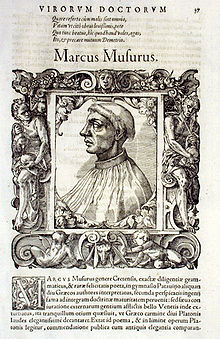- Marcus Musurus
-
Marcus Musurus (Greek: Μάρκος Μουσοῦρος, c. 1470–1517) was a Greek scholar and philosopher born in Retimo, Castello, Venetian Crete (modern Rethymno, Crete). The son of a rich merchant, he became at an early age a pupil of John Lascaris in Venice.
In 1505, Musurus was made professor of Greek language at the University of Padua. Erasmus, who had attended his lectures there, testifies to his knowledge of Latin. However, when the university was closed in 1509 during the War of the League of Cambrai, he returned to Venice where he filled a similar post. In 1516, Musurus was summoned to Rome by Pope Leo X, where he where he lectured in the pope's Gymnasium and established a Greek printing-press. In recognition of a Greek poem prefixed to the editio princeps of Plato, Leo appointed him archbishop of Monemvasia (Malvasia) in the Peloponnese, but he died before he left the Italian peninsula.
From 1493, Musurus was associated with the famous printer Aldus Manutius and belonged to the Neacademia (Aldine Academy of Hellenists), a society founded by Manutius and other learned men for the promotion of Greek studies. Many of the Aldine classics were published under Musurus' supervision, and he is credited with the first editions of the scholia of Aristophanes (1498), Athenaeus (1514), Hesychius of Alexandria (1514) and Pausanias (1516). Musuros' handwriting reportedly formed the model of Aldus' Greek type. Among his original compositions Musurus wrote a dedicatory epigram for Zacharias Kallierges' edition of the Etymologicum Magnum,[1] in which he praised the genius of the Cretans.
He died in Rome.
See also
- Byzantine scholars in Renaissance
Notes
- ^ Z. Kallierges (ed. and printed), Etymologicum Magnum Graecum (Venice 1499)
References
 This article incorporates text from a publication now in the public domain: Chisholm, Hugh, ed (1911). Encyclopædia Britannica (11th ed.). Cambridge University Press.
This article incorporates text from a publication now in the public domain: Chisholm, Hugh, ed (1911). Encyclopædia Britannica (11th ed.). Cambridge University Press. This article incorporates text from a publication now in the public domain: Herbermann, Charles, ed (1913). "Markos Musuros". Catholic Encyclopedia. Robert Appleton Company.
This article incorporates text from a publication now in the public domain: Herbermann, Charles, ed (1913). "Markos Musuros". Catholic Encyclopedia. Robert Appleton Company.- Rethymno in the Course of Time
Categories:- 1470s births
- 1517 deaths
- Greek educators
- Scholars from Crete
- Greek Renaissance humanists
- 15th-century Byzantine people
- 16th-century Greek people
Wikimedia Foundation. 2010.

